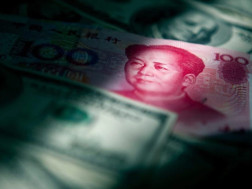Outflows of investment capital from China are growing, marking their biggest net decline in seven years and eight months in September. The trend is driven by foreign companies scaling back their operations in China and wealthy Chinese shifting funds abroad, analysts say.
The government is nervously eyeing the capital flight, imposing new restrictions on investors, as downward pressure on the Chinese currency grows.
According to China's State Administration of Foreign Exchange, which tracks monthly international financial transactions by domestic banks on behalf of businesses and households, the net outflow reached $53.9 billion in September. This is the largest amount since January 2016, when China logged a net outflow of $55.8 trigged by a sudden devaluation of the yuan called the "renminbi shock," among other factors.
The exodus of funds related to direct investment, such as construction of manufacturing plants, was noticeable in the September figures. The net outflow in that category reached $26.2 billion, roughly half the total and the largest amount since 2010, when comparable data first became available.
"Foreign companies may have accelerated the outflow of capital as they wrote down or sold their assets as a result of their retreat from China," said Toru Nishihama, chief economist at Dai-ichi Life Research Institute in Tokyo. The number of foreign companies in manufacturing and other industrial sectors reached its lowest point since November 2004 at the end of July, and it has remained flat since then.
The U.S. has moved to restrict American investment in mainland China. And Beijing's revision of its anti-espionage law in July, which expanded the scope of targets for espionage, may have contributed to capital fleeing the country.
The statistics do not indicate whether foreign or Chinese companies were main contributors to the transfer of funds from China. It may be that the drain in capital increased because Chinese companies are moving funds overseas in order to move into or expand in foreign markets.
Portfolio investment in stocks, bonds and other securities declined by a net $14.6 billion. As the Chinese economy struggles to bounce back from the pandemic, many foreign investors have grown leery of investing in the country. The balance of yuan-denominated bonds held by foreign investors through such means as Bond Connect, which allows investors from mainland China and overseas to trade in each other's bond markets through a link in Hong Kong, totaled about 3.2 trillion yuan ($436.93 billion) at the end of September, down some 20% from its peak at the end of January 2022.
Wealthy Chinese are also shifting their assets abroad out of concern over the future of China, according to many analysts. "Customer demand for transferring funds to real estate and other markets in developed nations began rising this spring," said an employee in the investment department of a Chinese financial institution.
In addition to the flight of investment capital, stagnant Chinese exports are weighing on the yuan. In the July to September quarter, sales of yuan to buy foreign currencies outpaced the reverse transaction by $38.6 billion, the largest figure in five years.
"Given strong expectations for the yuan's depreciation in light of the gap in interest rates between the U.S. and China, chances are high that businesses and others are increasing their holdings of foreign currencies without immediately changing receipts from exports into yuan," said Naoki Tsukioka, chief economist at Mizuho Research & Technologies.
The government is worried about the growing exodus of capital and begun taking steps to stanch the flow. The China Securities Regulatory Commission has issued a notice banning domestic brokerages from taking on new mainland clients for offshore trading, according to Reuters. It also intends to impose restrictions on new overseas investments by existing customers on the mainland. Brokerage houses, including their overseas divisions, must shut down apps and websites aimed at mainland investors by the end of October, Reuters said.
The yuan remains below to 7.3 to the dollar, down by about 6% versus the beginning of the year. Chinese President Xi Jinping and his government show signs of moving to stabilize the foreign exchange market. Xi on Tuesday visited China's central bank for the first time since becoming president, Nikkei Asia reports.























